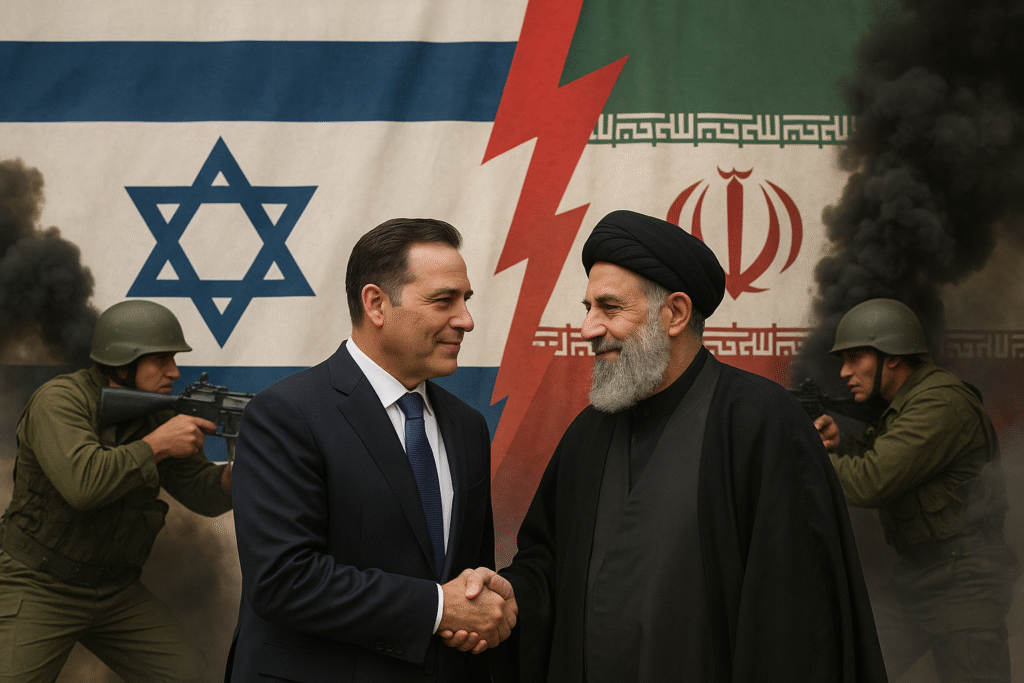1948–1979: Friendly Relations (Pre-Revolution Iran)
1948 – On May 14, 1948, David Ben-Gurion, the head of the Jewish Agency, proclaimed the establishment of the State of Israel. At first, Iran did not officially recognize Israel. However, the two countries quietly developed a practical relationship based on shared strategic interests. In 1949, Iran voted against Israel’s entry to the United Nations as a member. Despite initial opposition, shared strategic and political interests led Iran and Israel into a covert working relationship. However, in public, Iran declined to recognise Israel. On 6 March 1950, Iran was one of the first Muslim-majority countries to recognize Israel de facto. Iran reaffirmed its stance in 1949.
1950s–1970s – Under the rule of Shah Mohammad Reza Pahlavi, Iran and Israel: Iran followed a Western-aligned foreign policy during the Cold War and was a key regional ally of the United States. Israel, since it was dependent on American support, found a natural partner in Iran. They develop strong economic and military ties. The alliance, driven by mutual benefits, saw economic, military, and intelligence cooperation between Iran and Israel. Their bond strengthened further because they shared a common interest keeping the Communist USSR out of West Asia, with both nations backed by capitalist America. They shared intelligence through a secret alliance known as the “Periphery Doctrine,” aimed at building ties with non-Arab states in the Middle East that were hostile to pan-Arab nationalism. Iran, along with Turkey and Ethiopia, became a central partner in this strategy. In a secret meeting in 1958, Israeli Prime Minister David Ben-Gurion and Turkish Prime Minister Adnan Menderes formed the so-called “alliance of the periphery,” following which Iran, Turkey, and Israel established a pact known as the “Trident”. The relationship included intelligence sharing, economic cooperation, and arms trade. Notably, the Israeli spy agency “Mossad” and Iran’s spy agency “SAVAK” collaborated closely. Israel also provided military advisors and technical support to Iran, especially during the development of the Iranian military-industrial complex. Cooperate against Arab nationalist threats, especially from countries like Egypt and Iraq.
Oil Deals – Iran supplies Israel with crude oil, helping Israel during regional embargoes. The Israel-Iran relationship was significant economically too. Iran supplied Israel with crude oil, particularly after the 1967 Six-Day War, when many Arab nations imposed boycotts. In return, Israel provided Iran with advanced agricultural and technological assistance and modern military equipment and armaments to fight its war against Iraq in the 1980s. Iranians even imported advanced missile systems, guns, submachine guns, and aircraft engines from Israel, according to a piece in The Times of Israel. The Shah of Iran even admired Israel because of its military success against its Neighbours.
1979–1990: Islamic Revolution & Start of Hostility
1979 – Iranian Revolution:
The Shah is overthrown; Ayatollah Khomeini comes to power. After that, Iran became an Islamic Republic, which led to a complete reversal of Iran’s foreign policy. However, in the initial years, Iran and Israel continued with their ties.
Around the early 1980s, Ayatollah Khomeini labeled the United States as the “Great Satan” in a speech to express his belief that the U.S. was the source of Global corruption, Imperialism: Cultural and political domination. Israel began being called the “Little Satan”, as Khomeini and Iranian leaders viewed Israel as:
A puppet of the U.S.
An occupying force of a Muslim land (Palestine)
A threat to the Islamic world
Diplomatic ties with Israel are severed, and the Israeli embassy in Tehran becomes the Palestinian embassy. Iran made a symbolic move to reject and oppose Israel. Iran wanted to show that it does not recognize Israel and sees it as an occupier of Muslim land.
The Islamic Republic made support for Palestine a core part of its foreign policy and revolutionary ideology.
Ayatollah Khomeini said, “Israel must be wiped from the map” reinforcing Iran’s hostility.
To Break from the Shah’s Legacy. The Shah had allied with Israel, but the revolutionaries sought to do the opposite, demonstrating a clear ideological shift.
To Lead the Islamic World;
Iran aimed to take a leading role in opposing Israel and saw itself as a champion for the Palestinian cause and other oppressed groups in the region.
This made Tehran the only capital in the world to replace the Israeli embassy with a Palestinian one. Yasser Arafat was welcomed in Iran as a hero. In the 1980s, Iran began supporting anti-Israel groups like Hezbollah in Lebanon by giving them weapons, training, and money. Iran stated itself as the biggest enemy of Israel in the Middle East. However, during the Iran-Iraq War (1980–1988), Israel secretly sent weapons to Iran through the Iran-Contra affair because it saw Saddam Hussein as a bigger threat than Iran’s leader.
1990s–2000s: Escalation of Tensions
From 1992 onwards, Iran began developing its nuclear program. Israel saw this as a serious threat to its existence. Israeli intelligence believed that Iran was not just building nuclear power for energy but was secretly working on nuclear weapons. They also believed that Iran was hiding its true intentions. This fear grew stronger after some Iranian leaders said that Israel should be “wiped off the map.” Since Israel is a small country, its leaders believe that even one or two nuclear bombs could destroy entire cities.
2000 – Rise of Hezbollah in southern Lebanon (backed by Iran). As Hezbollah and Hamas are anti-Israel, Israel worries that Iran could share nuclear tech and dirty tech with them, which is a direct threat to Israel’s northern borders.
2006 – Israel-Hezbollah War:
The war is known as the Lebanon War”. Israel fought a 33-day war against Hezbollah in Lebanon. Iran is blamed for supplying missiles and funds. According to Israeli journalist Ze’ev Schiff, modern antitank weapons and thousands of rockets were supplied to Hezbollah by Iran. The U.S., British, and Israeli governments also state that Iran has provided military aid to Hezbollah.
Iran’s rhetoric: Iranian leaders, especially President Mahmoud Ahmadinejad (2005–2013), just like Ayatollah Khomeini, were also anti-Israel, calling for Israel’s wipeout, which Israel took as a serious threat. Mahmoud Ahmadinejad also promotes Iran’s right to nuclear and Islamic revolutionary ideals, which results in increasing global tension
2010s: Shadow War & Cyber Attacks
2010–2012 – Several Iranian nuclear scientists were mysteriously killed. Iran blames Israel’s intelligence agency, Mossad. This is a major chapter in the Iran-Israel conflict. Starting around 2010, a series of assassinations and sabotage attacks targeted Iranian nuclear scientists. Iran claimed that five scientists were killed by Mossad and Israeli forces.
Names of scientists and how they have been assassinated:-
Masoud Alimohammadi: Killed by a remote-controlled bomb in Tehran.
Majid Shahriari: killed by a magnetic bomb in his car.
Darioush Rezaeinejad: Shot dead outside his house.
Mostafa Ahmadi Roshan: killed in a car bomb.
Fereydoon Abbasi: was assassinated.
But from Israel, these claims are not confirmed officially. Stuxnet Virus (2010) – Stuxnet is a computer worm that was built to attack Iran’s nuclear facilities and has since evolved and spread to other industrial and energy-producing facilities. It is considered the first known cyberweapon to cause physical damage in the real world. Reportedly, it was done by Israel & the U.S. to damage Iran’s nuclear facilities.
2015- JCPOA (Joint Comprehensive Plan of Action)
2015 – Iran signs the JCPOA (Nuclear Deal) with world powers, also known as the Iran nuclear deal, a 2015 agreement aimed at limiting Iran’s nuclear program in exchange for sanctions relief. It was negotiated between Iran and the P5+1 (China, France, Germany, Russia, the United Kingdom, and the United States), along with the European Union.
The JCPOA was created to make sure Iran’s nuclear program would only be used for peaceful purposes. Iran agreed to cut down its amount of enriched uranium, reduce the number of machines (centrifuges) used for nuclear work, and allow global inspectors to check its nuclear sites. In return, the UN, US, and EU promised to lift economic sanctions on Iran.
The United States withdrew from the JCPOA in 2018 under the Trump administration. Since then, Iran has also taken steps away from the agreement’s restrictions, including increasing its uranium enrichment levels.
Israel Opposes the JCPOA
Israel said the deal delays, but doesn’t eliminate Iran’s nuclear capabilities.
Restrictions would expire after 10–15 years, allowing Iran to resume enrichment legally.
Sanctions relief gave Iran access to billions of dollars, which Israel feared would be used to strengthen terror groups.
2020–2024: Direct Clashes and Open Hostility
2020 – Israel begins normalizing ties with Arab nations via the Abraham Accords
Which states Historic peace agreements between Israel and several Arab countries, brokered by the United States. Countries that signed or normalized ties with Israel are the UAE, Bahrain, Sudan, and Morocco. Iran sees this as a threat, as Iran feels surrounded by a US-backed alliance. Also, the new trade between the Gulf and Israel weakens Iran’s economy. That same year, top Iranian nuclear scientist Mohsen Fakhrizadeh was assassinated—Iran blamed Israel for the killing. 2021–2023 – Frequent airstrikes by Israel in Syria target Iranian weapons shipments and militias.
October 7, 2023 – Hamas launches a surprise attack on Israel (Gaza war begins). Iran is accused of having indirect links or support to the attack. It led to a prolonged Israel-Hamas war.
Israel Defends Itself, Then Strikes Back
Luckily, Israel’s defense system, such as the Iron Dome, stopped most of the missiles and drones. Only a few caused damage. But Israel didn’t stop there. They quickly launched air strikes inside Iran, hitting military sites, drone factories, and other important places connected to Iran’s army. This was a direct fight between two powerful countries.
2025 – As of now:
Iran and Israel are not in a declared war, but they are in an open, undeclared military conflict.
Their fight is now direct, unlike earlier proxy wars.
Cyberattacks, drone warfare, and missile exchanges are frequent.
The relationship between Iran and Israel has changed from friendship to fierce rivalry. Today, they stand on the edge of direct war, with growing attacks and deep mistrust. What happens next could shape the future of the Middle East. The world watches closely, hoping peace will win over conflict.
By Himansh Kumar | June 19, 2025







